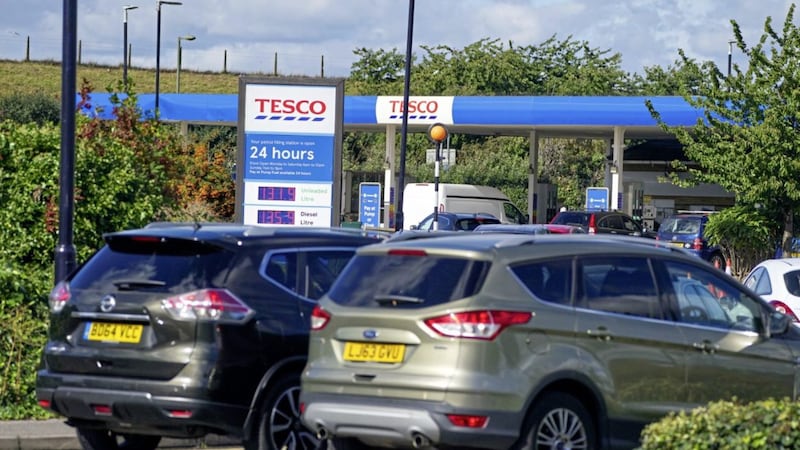Most of us always knew Brexit would end with the English pouring petrol down their trousers. But was it the protocol that spared Northern Ireland similar scenes?
As usual, the answer is complicated.
The shortage in Britain is not of petrol or diesel but of lorry drivers to deliver to filling stations. The protocol does not cover free movement of labour so it does not protect us from a driver shortage.
The operation of the sea border is irrelevant in this instance: Northern Ireland imports virtually all its petroleum products from Britain and has continued to do so. The Republic imports three-quarters from Britain, so if there was disruption to supplies crossing the Irish Sea it would be impacting the whole island, certainly in the immediate term, and we could not get around it by looking south.
The protocol’s critical help for fuel deliveries, according to one haulier interviewed by the Belfast Telegraph, is an EU diesel duty rebate for transport operators - to be clear, for the diesel powering lorries rather than any diesel they are delivering.
Transport operators in Northern Ireland can still apply for this rebate, which takes “quite a bit of pressure” off them in comparison to hauliers in Britain, according to the interview.
The political impact of the protocol is dominated by the concept of the sea border, with its constitutional symbolism and powerful imagery of physical trade, yet this is in many ways the most straightforward aspect of Northern Ireland’s unique Brexit arrangements. Most sea border processes should settle down with practical mitigation, while those that are genuinely unworkable, in particular involving medicines, seem likely to be scrapped in all but name.
In the longer term it is the rest of the protocol, its non-sea border aspects, that will become far more significant. Being bound into the entire body of EU law on the single market for goods is a vastly bigger deal than having to tick the paperwork of every hundredth lorry arriving in Larne. EU state aid rules have long been foreseen as the hardest issue ahead. The diesel rebate, with its major impact from an obscure rule, also feels like a taste of politics to come. It was not even certain Northern Ireland would get the rebate: the question was only resolved in July, when nobody outside the haulage industry noticed. We are barrelling towards a future of equally unforeseen consequences from arcane technicalities.
Whatever help the rebate provided, the protocol’s main contribution to preventing panic has been entirely psychological. If people here had rushed to fill up their cars the way motorists did in England, we would soon have witnessed queues, rationing and empty pumps. People did not do so because they were confident the protocol protected supplies. Even in these febrile late-pandemic days, there was no sign of panic buying whatsoever. Where were the TUV supporters, who polls claim comprise one person in eight? A fraction of their number would have been enough to cause forecourt chaos.
All of this is bad news for unionist parties as they try to craft simple messaging against the protocol. Reality is complicated, tempting unionist voters to simplify matters by making presumptions in the protocol’s favour.
There was comic timing in all four main unionist parties choosing this Tuesday, Ulster Day, to issue a joint statement opposing the protocol, at the height of the fuel story. It must have looked like a great idea a week ago when pharmaceutical companies were warning of disrupted medical supplies.
For the moment, it is premature to have any confidence in the protocol protecting deliveries to Northern Ireland. Grace periods on food and medicine have been indefinitely extended by London, with the EU’s acquiescence. If requirements on these items were implemented as originally agreed there would be empty shelves in our supermarkets and pharmacies. But unionism is struggling to explain that complexity. The four-party statement refers to “huge disruption” and “grave damage” in the present, “which will increase with the end of grace periods”.
Even the UUP cannot admit the sea border is currently operating quite well because its trickiest problems have been suspended.
The DUP’s fear is that London and Brussels will patch over those problems in the next few months, shortages will never materialise and unionist voters will grudgingly accept the sea border as a constitutional discomfort but a practical non-event - a grudge they will mainly hold against the DUP.
The lack of panic at the pumps shows that is a very plausible scenario.









